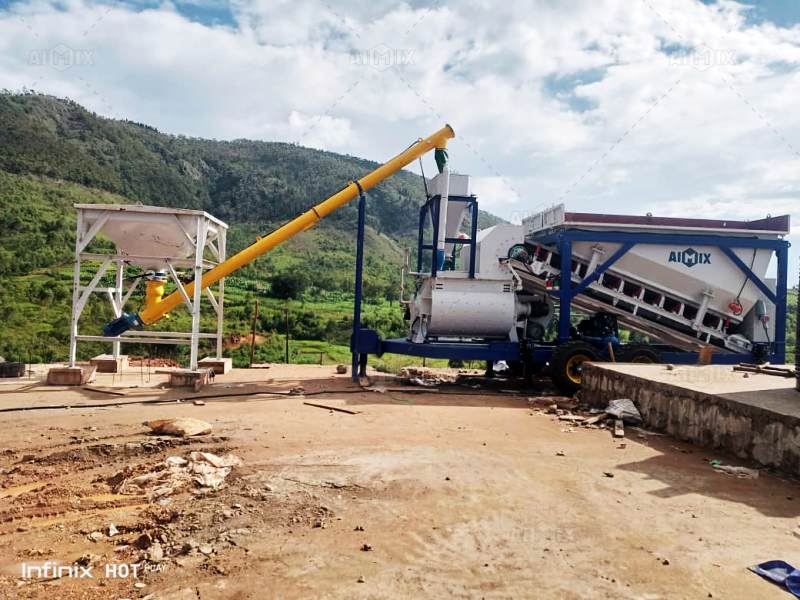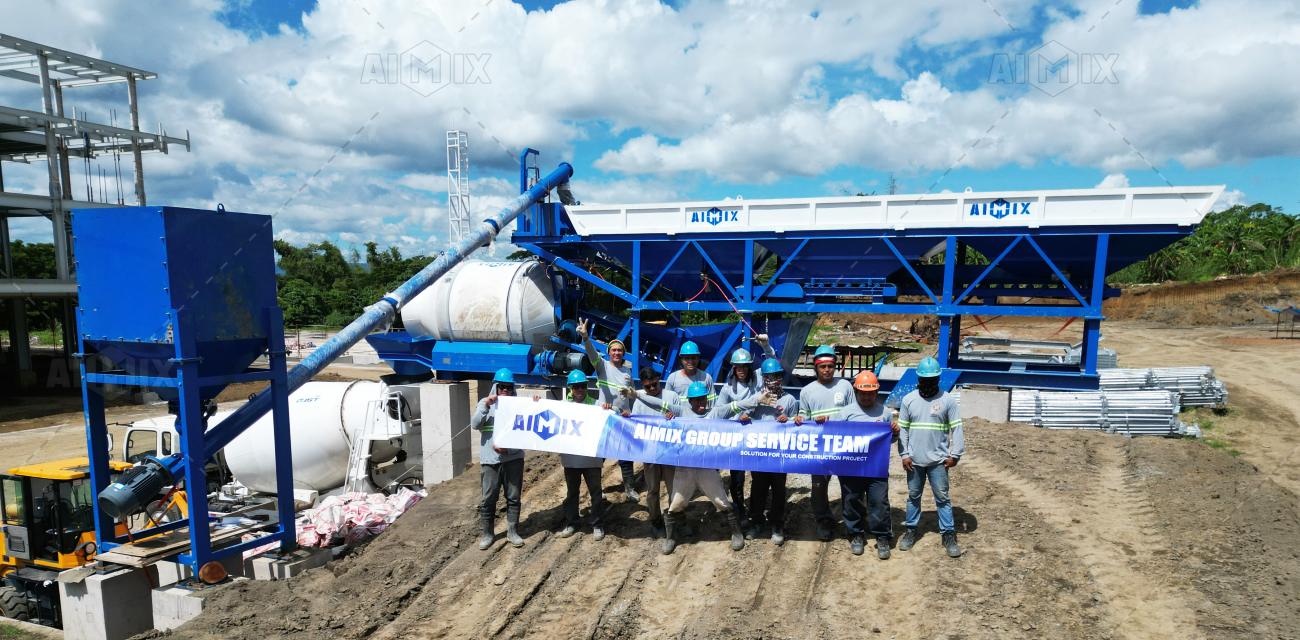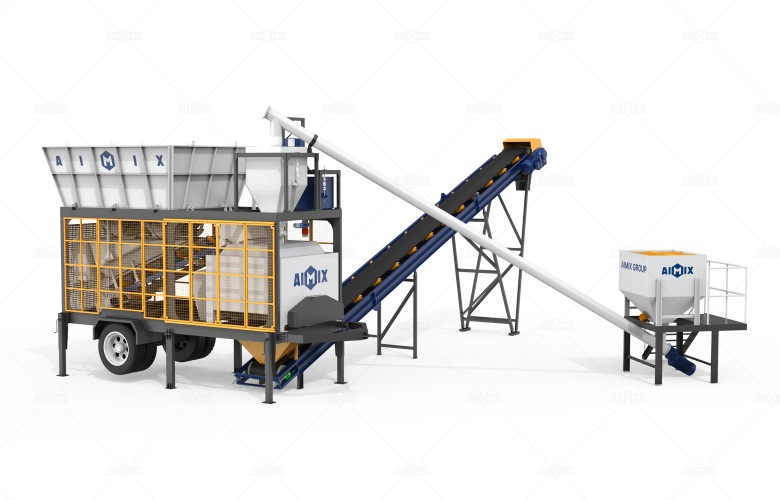Compact concrete batching plants have become a popular choice for urban and mid-scale construction projects due to their smaller footprint, flexible setup, and efficient output. Compared to traditional large-scale plants, compact batching solutions offer a streamlined approach to on-site concrete production, especially in cities or restricted spaces. However, despite their advantages, these plants must still operate within the regulatory framework of local, regional, and national authorities.
Understanding the permit and compliance requirements for compact concrete batching plants is essential for contractors, developers, and manufacturers alike. It not only ensures legal operation but also prevents costly delays, penalties, or shutdowns. This article explores the critical permitting aspects, environmental and zoning requirements, and how similar rules also apply to related equipment like the mobile concrete mixing plant.

1. Why Permitting Matters for Compact Concrete Batching Plants
Regardless of their size, compact concrete batching plants are classified as industrial equipment and therefore fall under various regulations. These regulations are intended to:
-
Protect the environment (especially air and water quality)
-
Ensure safety and health for workers and nearby communities
-
Maintain zoning compliance with land-use laws
-
Manage noise, dust, and traffic associated with construction operations
Failure to obtain proper permits or follow compliance rules can result in suspension of operations, fines, or even legal liabilities.
2. Common Types of Permits Required
Before installing or operating a compact batching plant, you typically need several permits depending on local jurisdictions. The most common include:
a. Land Use or Zoning Permit
Compact concrete batching plants must be installed in areas zoned for industrial or construction use. Local authorities will review:
-
Proximity to residential areas
-
Site accessibility for vehicles and raw material delivery
-
Noise and dust control plans
In some cases, even temporary use permits may be issued for short-term project-based installations.
b. Environmental Permits
Concrete batching involves cement, aggregates, water, and admixtures—all of which can impact the environment if not properly handled. Environmental authorities often require:
-
Air Quality Permits: These ensure the plant controls dust and emissions using filters, enclosed conveyors, and dust suppression systems.
-
Water Discharge Permits: If water runoff or slurry is generated, a wastewater treatment or recycling plan is required.
-
Noise Permits: Especially relevant in urban areas where noise ordinances are strict.
c. Construction and Installation Permits
These ensure the physical setup of the plant, including foundation work, electrical connections, and machinery installations, comply with safety codes.
d. Operational or Business License
Some municipalities require batching plant operators to obtain a general business license or operational certification before commencing production.

3. Compliance Requirements for Ongoing Operation
Permitting is just the beginning—ongoing compliance ensures that a compact concrete batching plant continues to operate legally and safely.
a. Emissions and Dust Control
Authorities may inspect plants for compliance with air quality standards. Compact batching plants must implement measures like:
-
Enclosed silos and conveyors
-
Dust collectors or bag filters
-
Water spray systems at loading/unloading points
Similar rules apply to a mobile concrete mixing plant, especially if it operates for extended periods at a single site.
b. Noise Abatement
Noise-reducing measures such as sound barriers, enclosed mixing units, and use of electric motors are encouraged to comply with community sound ordinances.
c. Material Storage and Spill Prevention
Cement, admixtures, and fuels must be stored securely to prevent leaks and contamination. Compliance includes having spill response plans and safety signage in place.
d. Waste Management
Concrete slurry, washout water, and excess aggregates must be recycled or disposed of according to environmental guidelines. Many compact and mobile concrete mixing plant models now feature closed-loop water systems to support this requirement.
4. Special Considerations for Mobile Concrete Mixing Plants
Mobile concrete mixing plants—often seen as the more flexible sibling of compact batching plants—also face similar permit and compliance hurdles, especially when used for longer periods at a fixed location.
-
In many jurisdictions, mobile plants that remain on a site for more than 30–60 days may be subject to the same zoning and environmental laws as stationary plants.
-
Mobile plants must still provide documentation for air and water quality compliance, especially when working in protected or urban areas.
-
Transport and traffic permits may also be required for moving the plant from one site to another.
For contractors using both compact and mobile units on a project, consolidating permits under a single operational plan is often recommended.
5. Global and Regional Differences
Permit and compliance requirements vary significantly across countries and regions. For instance:
-
In the United States, regulations from the Environmental Protection Agency (EPA) and local Air Quality Management Districts (AQMD) apply.
-
In Europe, the EU Construction Products Regulation (CPR) and Environmental Impact Assessment (EIA) directives are enforced.
-
In Southeast Asia and the Middle East, environmental permitting is evolving rapidly, with more emphasis on dust, water recycling, and site safety.
It’s crucial to consult with local regulatory authorities or environmental consultants before installation.

6. Best Practices for Easier Approval
To simplify the permit process and ensure full compliance, consider the following best practices:
-
Early engagement with local authorities before purchasing or installing the plant
-
Selecting pre-certified compact concrete batching plants from reputable manufacturers
-
Preparing detailed site plans, environmental assessments, and equipment specifications
-
Keeping digital records of inspections, maintenance, and operational logs
-
Investing in mobile or compact units with built-in compliance features, such as noise enclosures and water recycling systems
Conclusion
Compact concrete batching plants offer enormous benefits in space-saving, speed, and efficiency. However, navigating the maze of permit and compliance requirements is crucial for legal and sustainable operation. Whether you’re operating a compact plant in a city center or deploying a mobile concrete mixing plant for remote infrastructure, understanding and planning for regulatory obligations can save you time, money, and reputation.
Contractors, plant operators, and concrete batching plant manufacturers must work together to design and deploy equipment that not only performs well—but also complies with today’s growing environmental and urban standards.